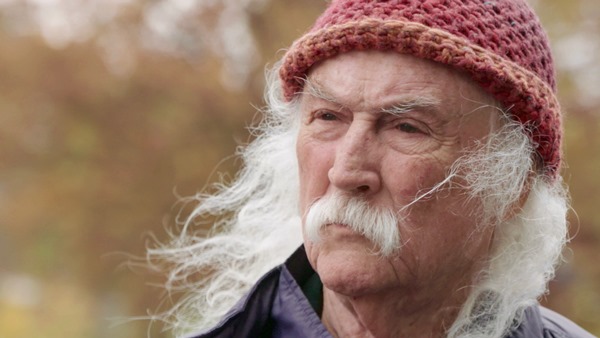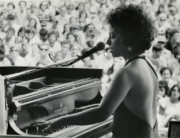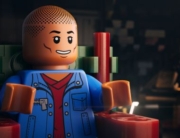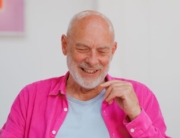Here is another tale of sex, drugs, and rock ‘n’ roll, told in the terms of the 12-steps admission of guilt and the music by a founding member of boomer-favorites the Byrds and Crosby, Stills & Nash (sometimes known as CSNY, with Neil Young). But septuagenarian singer/songwriter/guitarist David Crosby, who destroyed his liver and almost his heart and takes daily medications to control his diabetes and hepatitis, is not looking for forgiveness or to mend broken bridges.
Producer Cameron Crowe first interviewed him more than four decades ago as a teenager, like the 16-year-old Rolling Stone writer he fictionalized in his Oscar-winning Almost Famous (2000), and he has continued to do so over the years. He keeps asking as the off-screen interrogator: “How are you still alive?” Crosby, whose trademark song with CSNY was “Almost Cut My Hair,” shakes his now white long locks in disbelief and sorrowfully cites many of his well-known friends in fame who succumbed to their addictions.
Crosby has already produced two memoirs, Long Time Gone: The Autobiography of David Crosby (1988) and Since Then: How I Survived Everything and Lived to Tell About It (2006), so his willingness to now bare all his faults on film may be to help his solo career, as debut director A.J. Eaton follows his 2017 cross-country tour that the musician’s health won’t quite let him complete. (Crowe found the time to participate while he develops the stage musical adaptation of Almost Famous.) The biographical elements, backstage romance with internecine gossip, and musical history tidbits are supplemented by intimate and concert archival footage, along with iconic album cover photographs by jovial Henry Diltz, smoothly edited by Elisa Bonora (Glen Campbell: I’ll Be Me) and Veronica Pinkham (the upcoming Linda Ronstadt: The Sound Of My Voice).
Crosby’s musical memories are of the most value, starting with his recollection of seeing John Coltrane give the most intense performance he’s ever seen, both in a small club and on into its bathroom. A drive along Sunset Boulevard reminds him of early gigs and other rockers with whom he shared time and weed. (His repeated disdain for the Doors’ Jim Morrison is supposedly humorous.) Most revealing is a ride through Laurel Canyon of the Hollywood Hills (as musically surveyed in Andrew Slater’s current documentary Echo in the Canyon), and he quotes the song “Woodstock” about what brought them there: “I have come to lose the smog.”
Crosby has the car stop at a grocery store where he name-drops the musicians he would bump into there. He becomes more enthusiastic when he locates the namesake of the song “Our House,” where his life and notable musical harmonies intertwined with Graham Nash, Stephen Stills, Neil Young, and Joni Mitchell. His discussion of Mitchell turns from her talent that he briefly promoted to his personal failures, marked by a break-up song she venomously directed at him. Devoted fans may enjoy confirmation of the complicated relationship referenced in other CSN and Mitchell songs.
The big successes of his bands, including CSNY’s performance at Woodstock (a PBS documentary on the festival is upcoming in August), speed by along with concert footage and a few interview clips with his bandmates. He remains passionate about the Kent State University shootings of four students by the National Guard on May 4, 1970 (one was the son of my family’s friend), while he tours an exhibit at the school’s library featuring blown-up photographs from that day. The event was marked by CSNY’s quickly recorded protest song “Ohio.”
There is a great deal of personal unburdening, from stories of his love of sailing (that surfaced in the song “Wooden Ships”) to how awful he behaved when he gave in to the heroin and cocaine addiction that permanently ruined his health, career, and connections to most other people. His supportive, usually private, wife Jan allows herself to be included briefly in the film, though details of when their life together started and of Crosby’s children are just vague—there’s no mentioning that he has been recording with a son. (I didn’t find his recent songs in the movie particularly memorable.) The documentary stays away from most tabloid topics, except for his times in and out of jail, where he finally and gratefully got clean (and even short-haired), though he admits he is still difficult.
However gut-opening Crosby may be, most of the details here may be of little interest, or too much like other musician bio-docs, to anyone much younger than Crosby and Crowe, unless they have developed an interest in the 1960s–’70s and its popular music.

















Leave A Comment